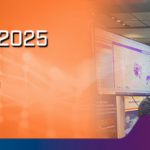Get to know the faces that are working hard behind the scenes to unleash your data’s potential.
This month for our Face Behind the Data profile series, we are excited to introduce, Dale Blue, Principal Consultant – National Data Repositories (NDR) . Since joining Katalyst, Dale has played a key role in implementing NDR strategies and plans that will drive growth and success for the company.
Dale’s passion, enthusiasm, and ambition has been a great contribution to Katalyst. We are excited he could contribute his experience to Face Behind the Data, a series of profiles that feature the hard-working employees behind the solutions and services at Katalyst.
What is your educational and work experience background?
My professional foundation was laid early, starting with a two-year certification in electronics during high school. I then studied Electronics Engineering at Oklahoma State and later earned a degree in Information Systems Management from the University of Maryland Global Campus.
In 1989, I began my career at Tape Technology, a seismic tape transcription company, responding to an ad in the paper looking for computer operators that could lift 50 lbs. Data used to be very heavy you see. My education enabled me to quickly learn the complexities of E&P data management. Over the years, I’ve held various technical and management roles with some of the largest E&P software and services companies including Halliburton, CGG, and SLB to deliver state of the art solutions. I’m excited to continue this journey at Katalyst Data Management as I’ve always felt they provide a great offering.
What are some of the highlights of your career?
Recently, I learned that a system I implemented 20 years ago is still operational, supporting critical workflows. It’s rewarding to know that such projects, involving complex technologies and teams, have long-lasting impact.
Another highlight was meeting with a deputy minister of energy from a major OPEC nation to discuss digital transformation’s role in their economic development. It was fascinating to hear firsthand from a world leader how they view data as the foundation for their future development.
The greatest highlight has been the relationships I’ve built. My career has taken me from Arctic Siberia to South Pacific islands, and I’ve shared meals and ideas with people from diverse cultures, including energy ministers and field workers.
Did you grow up wanting to be a data manager?
The title of ‘Data Manager’ didn’t exist when I was young as far as I know. What shaped my career was my early exposure to technology through my father, who was the Data Processing Manager for Oklahoma City. My earliest memory is learning to spell my name on keypunch machines and later, learning how to flowchart a process. By age 13, we had a TRS-80 computer at home, and I was writing software and building computers from discrete components.
Although I didn’t consciously aspire to be a data manager, my fascination with technology and problem-solving naturally led me to this field.
How did you get here?
My career path has been shaped by two key principles: saying “yes” to intimidating opportunities and benefiting from exceptional mentors.
Whenever presented with a challenging project or a new role that seemed beyond my current skill set, I rarely turned it down. Even when unsure how I would handle the obstacles, I viewed these opportunities as learning experiences, which consistently helped me grow.
Equally important were the mentors who guided me along the way. They offered invaluable advice, shared their experiences, and encouraged me to push my boundaries. Their influence has been instrumental in my journey, and I’m grateful for their investment in my development.
What are some big lessons learned and/or challenges faced along the way?
One significant lesson is that technical challenges are often easier to overcome than resistance to change. Implementing new technologies in organizations requires not only technical expertise but also the ability to help people adjust their workflows. Success depends on guiding users to embrace new tools and processes, which often involves patience, communication, and empathy.
Another important lesson came from working and traveling around the world: people are more similar than different. No matter where I’ve been—whether in a corporate office or a remote field location—most people share common aspirations: peace, security, and a better life for their families. Recognizing this has helped me navigate cultural differences and find common ground in even the most challenging situations.
What advice do you have for people beginning their career?
Don’t underestimate your potential. Take on projects or roles that seem daunting; they’re often the best learning opportunities. While it’s essential not to overcommit, pushing your boundaries can lead to significant growth.
Also, get involved in professional organizations. Building a reputation within the industry beyond your company can open doors and position you as a leader. Volunteering and contributing to industry initiatives not only help others but also enhance your visibility and credibility.
Are there any organizations or volunteer groups that you are passionate about?
I’m glad to see the OpenGroup OSDU Forum is gaining a lot of momentum and making strides in developing data management standards. The recent Face-to-Face meeting in Houston showcased the platform’s growing engagement, and I’m excited about its potential to solve real-world data challenges.
On a personal note, I’m passionate about Hope Disaster Recovery, where my wife serves as Program Director. The organization supports underserved communities in Greater Houston and East Texas, helping families rebuild after disasters through volunteer-led home restoration and financial aid distribution. Their work has made a meaningful impact in our community.
What are some of your favorite things to do and/ or places to visit outside of work?
My wife and I enjoy nature walks, exploring trails around Houston, such as Brazos Bend State Park and Sam Houston National Forest. These outings provide a refreshing break, offering a change of scenery from the city and an abundance of diverse wildlife. Watch out for the alligators in Brazos Bend.
With our children now living independently—one in Portland, the other in Dallas—our travel often centers around visiting them. Both cities offer unique attractions, making each trip a wonderful blend of family time and exploration.


